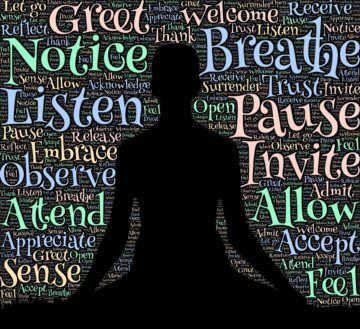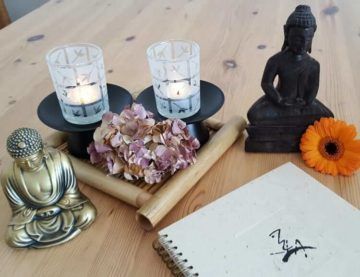
Health-Care IS Self-Care
If there was one message that I would like to get out en masse, it would be the importance of investing in your health. The message would be the understanding that caring for the parts of you that no one sees is just as important, if not more so, than the habit of focusing solely on what is on the outside. Don’t get me wrong, looking good can contribute to a more positive state of mind. And sometimes the time devoted to manicures and pedicures are the only time one takes to themselves, or the only time one has to catch up with friends in a fun and relaxing way. There is definitely value in this. But how much does having a rockin’ body mean when your mental health is fragile? Or what kind of joy are you feeling when your mental health is strong and stable, but you are in constant pain or discomfort? We need to understand that health care is self-care. We need to begin focusing our resources on healing and maintaining health on all levels of our being so that we can be more balanced and joyful when engaging with the world around us.
The American Institute of Stress reports that up to 90% of visits to the doctor are in some way related to stress, and that around 60% of adults are using alcohol as a means of coping with stress on a daily basis. They state that about 50% of people have difficulty sleeping due to stress related issues, and as a result, around half of our population is walking around feeling fatigued every day (see statistics here). These statistics were reported in January, 2021. I imagine they haven’t gone done since then.
As much as I would love to say that acupuncture is the cure-all, the benefits of this or any other healing modality can be limited based on daily lifestyle choices. Because so many of us don’t even know where to begin when we start shifting our focus and changing our habits, I’ve come up with my own list of what I feel are the most important aspects of managing the stressors in our lives.
- Drink more water. Probably 75% of my clients report that they don’t drink “enough,” water. Water is vital to all aspects to our health and wellbeing, and even minor dehydration can result in chronic fatigue, headaches, fuzzy thinking, and dips in our mood. A good rule of thumb for what is “enough” water (yes, I’m speaking only of unadulterated water) is to take your body weight and divide it by two. The resulting number is the number of ounces of water you should be drinking every day. This number will go up in a dry climate or if you are engaged in physical activity, but it is a good starting point. Consider how to do this without using disposable, plastic water bottles as well – it’s cheaper, free from harmful chemical by-products, and better for our planet.
- Get more sleep. The average adult (we’re all average in this instance) needs between 8-10 hours of sleep per night. In alignment with nature, this number is probably closer to 10 hours in the winter and 8 in the summer, but again, it is a good starting point to keep in mind. Now, you can certainly “get by” on less sleep, but for how long? Sleep is the time of cellular detoxification and regeneration – do you really want to skimp on this? And there’s nothing wrong with some caffeine as an occasional pick-me-up, but are you reliant on it to function? If so, it’s time to reconsider your nighttime routine.
- Move your body. We live in a climate where it is easy to engage in outside activities for much of the year. Fresh air and sunshine are vital to our well-being, so always take advantage of the opportunity to clear your lungs with fresh oxygen from nature. Walk, run, dance, do yoga, play tennis, play with your dog…the options are unlimited. The important thing is to move your body intentionally every day. Get your heart rate up to increase the flow of blood and oxygen to all cells in your body for improved mental clarity, immune function, physical strength and overall feelings of health and vitality.
- Re-evaluate your diet. I have always had the mindset of the 80/20 rule. Eat well – lots of fruits, veggies and nutrient dense foods that are low in carbohydrates – 80% of the time. This becomes a habit, not a fad diet. If you follow this, you allow yourself 20% of wiggle room to enjoy (yes, enjoy) small doses of whatever you’d like (as long as it’s not otherwise adversely affecting your health). The key is to have a healthy relationship with your food and enjoy what you are eating, even when it’s not optimal for your dietary goals.
- Break up with your news feeds. We have more than enough facts at our fingertips to get us through any day. Do we really need to know what is happening – most of it out of our control – on a play-by-play basis? What if you just checked in with the news once or twice a day for a limited amount of time? Do you ever have warm fuzzies after watching the news? If not, it may be time to disengage for a while.
- Ditto for social media. While there are some great benefits to being so “connected” with others, there have been innumerable studies that show just how harmful social media can be in our lives. We compare ourselves to curated images and feel worse about ourselves. Or we just can’t stop checking the feeds of a foe. Does this make you feel warm and fuzzy? If not, you know what to do.
- Do you have a therapist? I believe everyone needs a little therapy now and again.
- Socialize more. In Person.
- Spend more time outside.
- Laugh more. Engage in activities that bring you joy. Engage with people who bring you joy. Watch funny shows. Pet your cat. Practice mindfulness. Connect with your breath. Get acupuncture. Get a massage. Smile.
If you follow the above pointers, I guarantee (yes, guarantee) your health will improve as if overnight. You are in control of your health, and these simple tips can be a starting point for reconnecting to yourself, to your joy, to your center. It’s at this point that the inside of you can shine out to meet whatever challenges you face with more grace and balance. It’s at this point that real healing can begin.











